The OLS program is offered to the researchers and potential academic leaders who want to become ambassadors for Life Science in their communities. Developed as a part of the Mozilla Open Leaders X, this 15-week long personal mentorship and cohort-based training enable sharing knowledge, connecting communities and empowering individuals involved in this program.
Ever since the launch of this program on October 25, we have been asked by several people on different occasions why we care about mentoring people in Open Science and what motivated us to design this program. The three of us might have started working on this project with different ideas in mind, but when we actually started to finalize our potential target audience and topics for their training, we knew that with this program we want to promote a culture of Open Science that is intentional and inclusive.
I spot a very popular @MozOpenLeaders term: "open by design". Designing openness intentionally helps to bring in the diverse viewpoints and enable the inclusiveness in a structured way that "open by default" does not. #ismbeccb #BOSC2019 #ismbeccb2019 pic.twitter.com/KkULcHKsw3
— yo #UCUstrike yehudi🏳️🌈🇪🇺 (@yoyehudi) July 25, 2019
We believe that an inclusive project can be “designed” only when multiple perspectives are involved in making decisions that can truly benefit our participants from diverse backgrounds and identities. To involve a wider perspective, we reached out to a few Open Science experts in our network and invited them to share insights from their Open Science journey, tell us their personal stories related to mentorship, and provide us feedback on the first draft of our program.
The five members (listed alphabetically): Anne Fouilloux, Caleb Kibet, Mateusz Kuzak, Paula Andrea Martinez, and Sarah Gibson were invited from different professional and personal backgrounds. They kindly agreed to be interviewed by us and capture their personal experience with open Science and mentoring.
In this blog post, we want to share a few highlights from their interviews and acknowledge their contributions to designing this program.
Anne
Anne’s Open Science journey started by learning alone, searching answers for her queries online, which unfortunately often led to not knowing what she could do next. She was selected to the Mozilla Open Leadership 7 program that helped her apply her knowledge in a structured way. As a scientific programmer at the Dept of Geosciences, Anne supports researchers and students in using supercomputing resources at the University of Oslo.
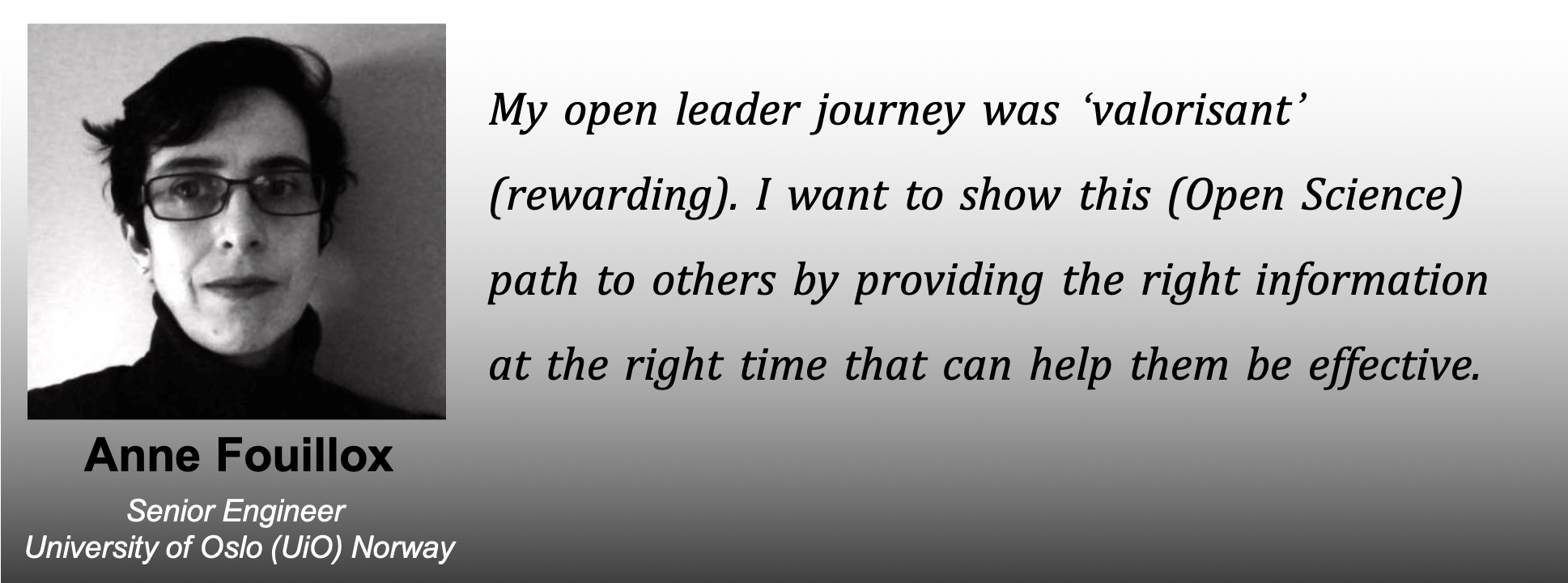
As a Mozilla Open Leaders herself, she commended the planned sessions on creating project roadmap and contributor guidelines in our syllabus, which according to her are keys to defining Open Science projects. She also appreciated that we will be focusing on inclusivity by teaching ally skills. Anne suggested to avail the training materials for others in the community who might not be from the life science fields but can benefit from the program. She also advised that in our Open Access publication session, in addition to scientific manuscripts, we should encourage people to have wider outreach by using tools such as blog posts, informal events, and Twitter.
Caleb
Caleb started his Open Science journey during his PhD. He was keen on becoming a modern scientist and breaking the conventional academic culture by taking advantage of the Open Science space. From the beginning of his career as a bioinformatician, he has been using Open Source tools, sharing version-controlled Open Source codes, designing reproducible research and publishing his work using open and transparent model such as of F1000. He helps his colleagues and mentees to use tools such as Jupyter notebooks for teaching, GitHub for code reviewing and supervision, and networking via Twitter. As a current Mozilla fellow, Caleb aims to grow OpenScienceKE, a community of scientists, researchers and students seeking to promote open science practices in Kenya.
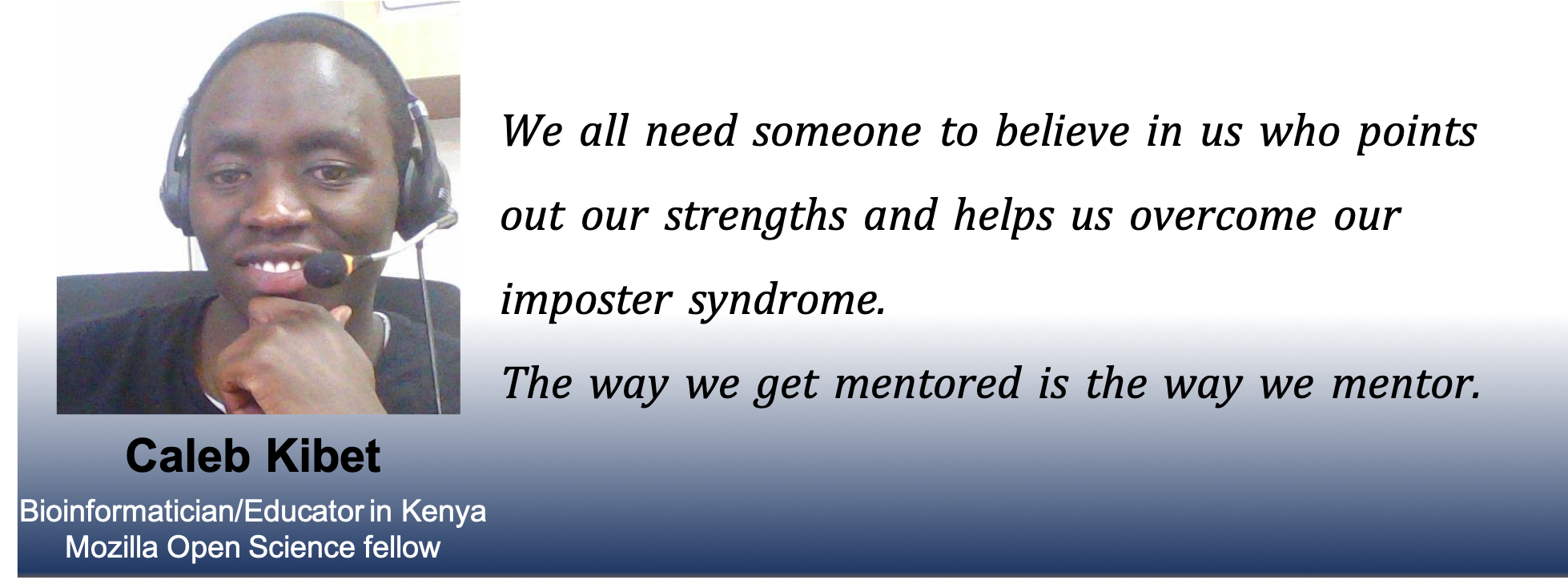
Caleb advised us to run discussions around the necessity of Open Science in bioinformatics by asking questions such as “why should our participants care?” and “what’s in for them?”. He recommended including resources such as protocol-io and pre-registration in our program that wet-lab biologists can use to become open scientists. He also asked us to mention the existing challenges in life science, and the barriers (i.e. funding, security, culture) and ethical issues (i.e. protecting sensitive medical data) that need to be respected when working with people from different communities.
Mateusz
Mateusz recalls that during his PhD he was not familiar with open science and hadn’t been encouraged to have a sharing mindset. For example, he often read papers about software and tools that were not publicly available that gravely limited his research and discouraged him from continuing with his work. He moved to The Netherlands to work with the bioinformatics community and started to contribute to the discussions about reproducibility, open science, open-source and related topics in The Netherlands bioinformatics programmers’ meetings, The Carpentries training events, and Mozilla study group. As the Community Officer at the Netherlands eScience Center, Mateusz provides community building and training capacity around Research Software Engineering, software best practices, open science and reproducible research.
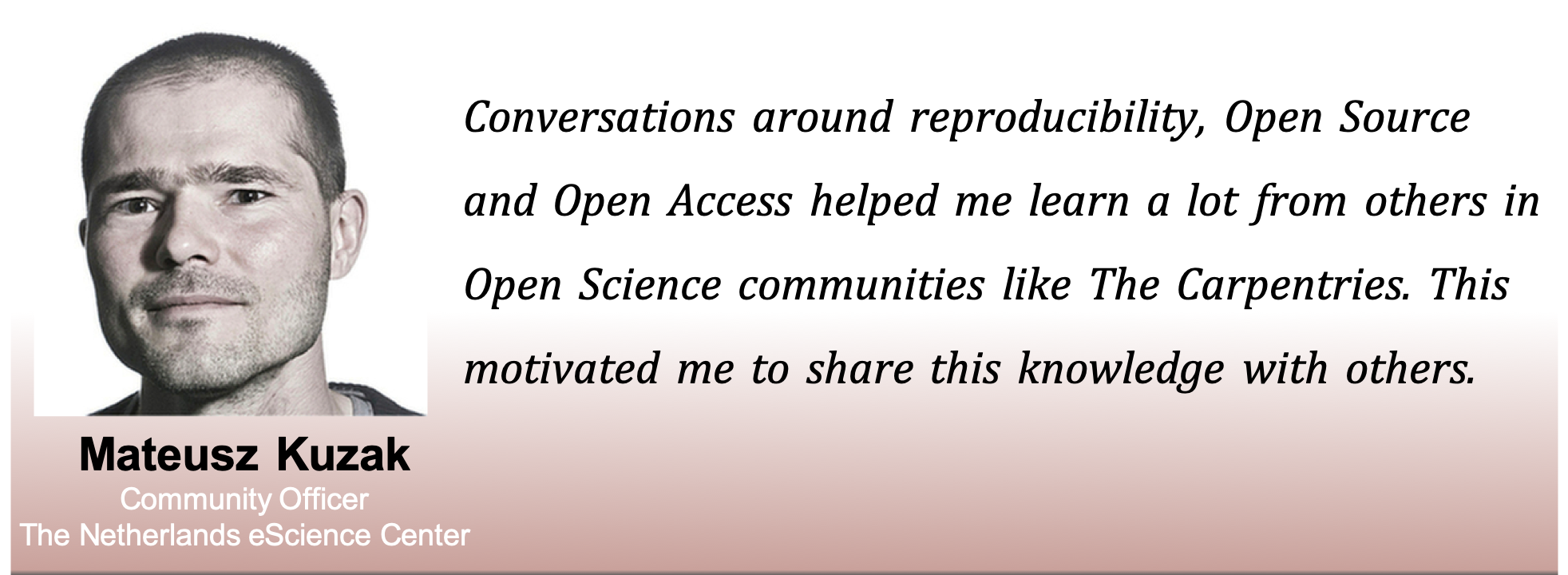
Mateusz found the schedule for our program very clear. His major concern was to ensure that the mentors are given the training (e.g. time management, leadership etc.) they need to feel more confident about their role in this program. He also recommended us to clarify the path for our mentor to become an expert in future by providing further guidelines and training.
Paula
Paula did her PhD in Computer Science and even though she was not aware, she was already using Open Science techniques in her research. In the beginning, she was writing open-source software to share with her colleagues, which further encouraged her to develop learning materials to share with others. Though she was taught the principle of software development, such as the importance of version control, it was only after working with The Carpentries she actively started to share her work openly on GitHub. As the National Training Coordinator - Characterisation Community, Paula provides support to her colleagues in the areas of Data Management, Open Source approaches and implementation of FAIR (Findable, Accessible, Interoperable and Re-usable) principles in bioimaging.
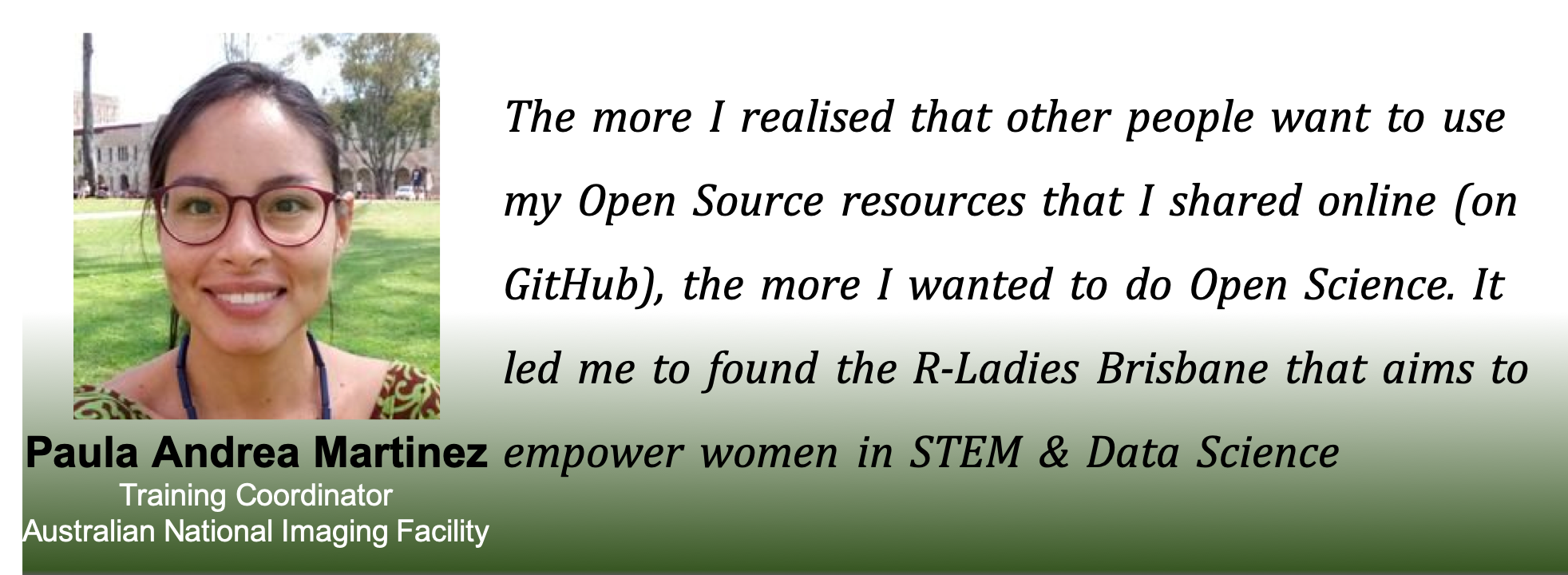
Paula commented that the cohort calls in our program will lower the barrier by involving everyone in the conversations and making their voices heard. She suggested that with appropriate examples we should show the benefit of this program before training our participants in Open Science skills. She believes that when people can see the value of the intended training in their work, they feel motivated to contribute more.
Sarah
Sarah Joined the Alan Turing Institute after finishing her PhD project, where she was introduced to Open Science by working on The Turing Way. One of her biggest surprises was that many of the skills and tools she had already been using were Open Source, such as Binder. Learning and being part of an openly developed project from the start made it really easy for her to put her knowledge of Open Science processes into perspective. She acknowledged the project lead, Kirstie Whitaker, who involved her in this Open Science platform and encouraged her to take a lead wherever she could.
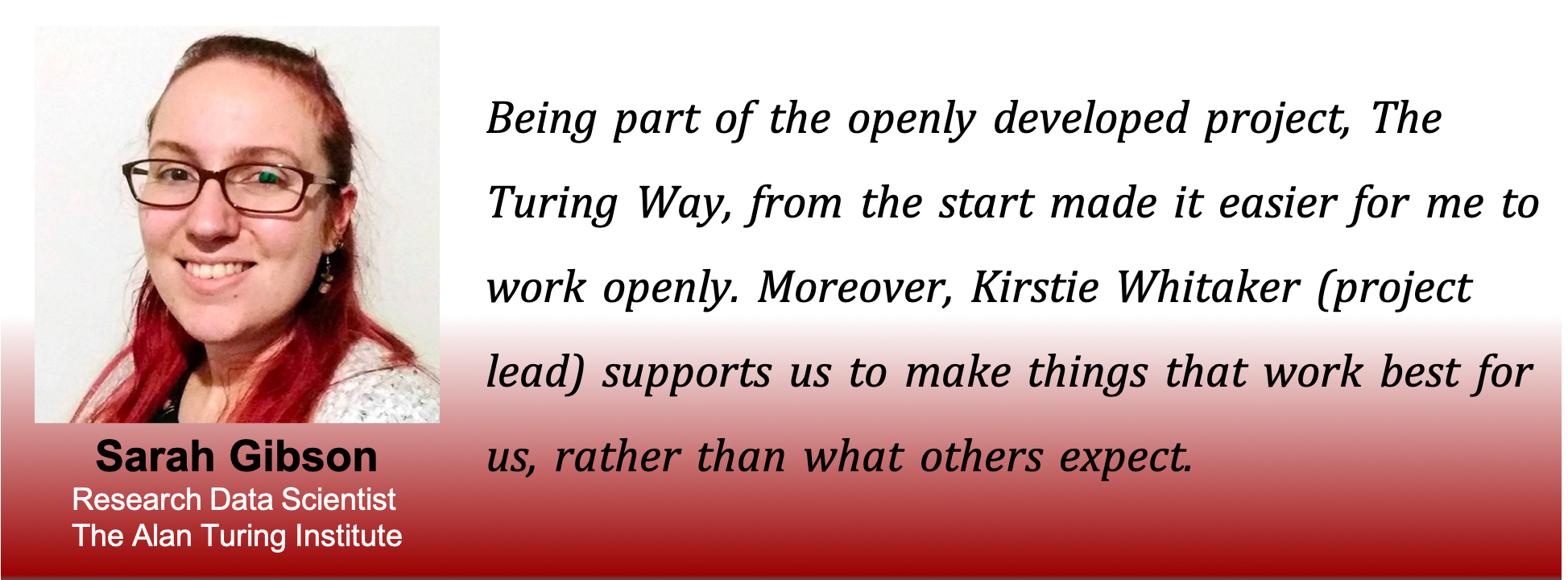
Sarah thinks that the mandatory cohort calls will allow our participants to get to know each other and go through shared experiences. She urged us to make sure that we avoid our mentees from feeling isolated which may affect their overall productivity. In order to provide a welcoming environment throughout our program, we should review our materials to remove any gendered language. She also suggested that all our mentors and mentees should be made aware of the experts who will be available to help them.
We are grateful to these Open Scientists who helped us to revise our program by providing their sincere feedback. Here are a few areas where we were able to improve our program based on their suggestions:
- As pointed by Caleb, we revised our program section to clarify why we focus on life science and what benefit our participants will have by joining this program.
- Based on the recommendations made by Anne and Paula, we introduced Open Data in our curriculum and will be using FAIR principle to teach them.
- In agreement with Mateusz’s recommendations, in addition to 2 mentor training calls, we included 2 catch-up calls with mentors during and at the end of the cohort. This will ensure that our mentors will have a platform to exchange their experiences and feel supported.
- In alignment with Paula’s suggestion, we have included questions in our application for the mentees to state their expectations from the program. Mentors of specific expertise will be assigned to mentees to match their expectations.
- In agreement with Sarah’s suggestion, we have published our mentors’ and experts’ profile on our website and have listed their areas of expertise. We will also share relevant information with our experts and mentors to allow them to get to know each other and exchange resources whenever required.
Join a Webinar on 27 November 2019 & Submit Your Application Until 8 December 2019!
With these changes, we are happy to inform that the call for applications for this program is open. Please visit EasyChair to submit your proposals until 8 December 2019. An information session will be hosted on 27 November 2019 to address your questions regarding this program (see details).
Finally, we want to invite our readers to feel free to reach out to us at team[at]we-are-ols.org with any suggestions that can make this program more welcoming and beneficial for others in our community.